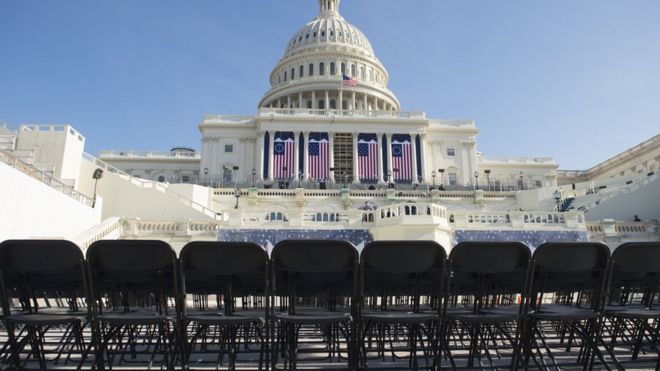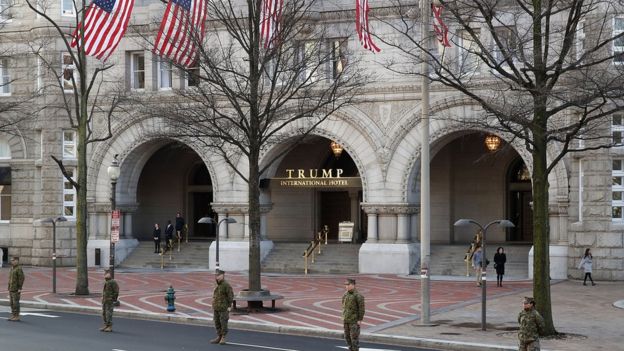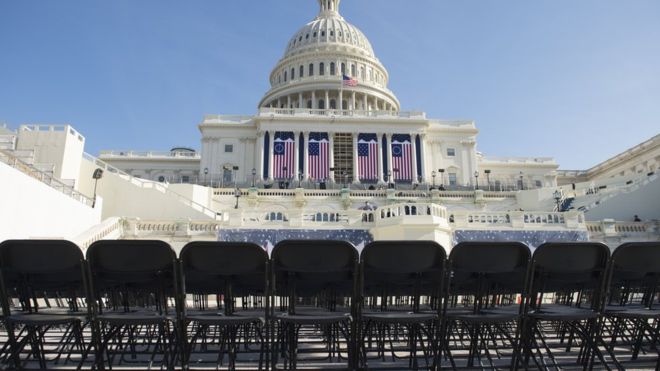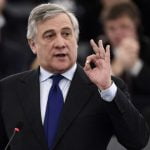
A rising number of Democratic lawmakers have said they plan to boycott President-elect Donald Trump’s inauguration at the US Capitol on 20 January.
More than 50 House Democrats are refusing to watch as Mr Trump is sworn in as the 45th US president amidst a feud between the newly elected president and the civil rights activist and congressman, John Lewis.
Why is there a boycott?
Mr Lewis, a revered member of the 1960s struggle, sparked controversy on Friday when he called Mr Trump’s victory illegitimate because of Russia’s alleged interference in the election.
The president-elect hit back on Twitter, attacking the Georgia lawmaker as “all talk, talk, talk – no action or results”, which prompted a wave of outrage from people saying if anyone embodied action, it was the 76-year-old.
Dozens of members of Congress have announced they will skip the event.
“I will not celebrate a man who preaches a politics of division and hate,” Representative Keith Ellison of Minnesota tweeted following the row.
“Skipping Inauguration. @RepJohnLewis a civil rights hero. Enormous responsibility to be POTUS. I respect the office, can’t tolerate disrespect,” Maryland Representative Anthony G Brown also tweeted.
The number grew to more than 40 over the Martin Luther King holiday weekend, but that did not stop Mr Trump from continuing to rail against the civil rights icon on Tuesday.
The president-elect tweeted that Mr Lewis had falsely claimed this would be the first inauguration he has missed since joining Congress in 1987.
“WRONG (or lie)!” Mr Trump tweeted, saying Mr Lewis had skipped George W Bush’s inauguration in 2001.
Mr Lewis’ office confirmed that he did miss Mr Bush’s ceremony.
“His absence at that time was also a form of dissent,” said spokeswoman Brenda Jones.
“He did not believe the outcome of that election, including the controversies around the results in Florida and the unprecedented intervention of the US Supreme Court, reflected a free, fair and open democratic process.”
Has this happened before?
Anthony Zurcher, BBC News, Washington
Although everything connected with President Donald Trump seems unprecedented, this isn’t the first time an opposition party has boycotted a presidential inauguration in sizable numbers.
According to Arizona State University historian Brooks Simpson, 80 lawmakers missed Richard Nixon’s 1973 swearing-in ceremony.
Representative John Lewis, a vocal Trump critic who plans to stay at home on Friday, also sat out George W Bush’s 2001 event, along with some other members of the Congressional Black Caucus.
Nothing quite compares to the harsh glare of today’s media spotlight, however, and coverage of today’s protesting politicians is only being amplified by Mr Trump’s Twitter broadsides against his critics.
As with any such partisan show of defiance, there’s a risk the move will cause wavering Republicans to rally around their embattled president.
At this point – with conservatives holding sway in Washington, DC – party unity is perhaps the most important factor in whether Republicans can successfully enact their policy agenda.
While making a show of sitting out the inauguration might be a feel-good moment for liberals with few arrows in their political quiver, going forward their success will depend on finding ways to fracture Republican ranks, not steel their opponents’ resolve.
Are other people staying away?
An estimated 800,000 to 900,000 people are expected to flood the nation’s capital on Friday for the inauguration, but it is unclear whether they will be there in celebration or protest, officials said.
President Barack Obama drew an estimated 1.8 million people to Washington when he took office eight years ago.
The “level of enthusiasm” and demand for hotel rooms has not reached that of previous inaugurations, according to Elliott Ferguson, president of Destination DC, the city’s convention and tourism bureau.
In fact, some hotels have reduced the minimum-night stay from four nights to two.
 Image copyrightGETTY IMAGES
Image copyrightGETTY IMAGESOther hotels are only 50% full, but higher-end hotels appeared to have more bookings, he added.
“It’s been much, much slower than anyone would have anticipated for a first-term president,” Mr Ferguson said.
Mr Trump’s swearing-in comes at a time when the nation appears deeply divided after the contested election.
Though Mr Trump swept the electoral college, his Democratic opponent Hillary Clinton won the popular vote by almost 2.9 million more votes.
- The tweets that say so much and reveal so little
- Trump on Twitter: A history of the man and his medium
- Will Trump’s election lead to more women in politics?
What are Trump’s approval numbers?
Recent polls have also showed historically low marks for any presidential transition.
A new ABC News/Washington Post poll found just 40% of Americans view Mr Trump favourably compared with the 79% President Obama received in 2009.
A CNN/ORC survey released on Tuesday also showed Mr Trump with a 40% approval rating compared with the 84% Mr Obama had in 2009.
A Gallup poll conducted two weeks before the inauguration found 51% of respondents disapproved of how he is handling the presidential transition compared with 44% who approved.
But the president-elect on Tuesday dismissed the polls as “phony” and “rigged”, insisting that “people are pouring into Washington in record numbers”.
An estimated 200,000 people are also expected to convene in Washington a day later for the Women’s March on Washington.
Nearly 200 activist groups and organisations have signed on to support the grassroots march.
It sets out to demonstrate for racial and gender equality, affordable healthcare, abortion rights and voting rights – issues perceived to be under threat from a Trump presidency.







